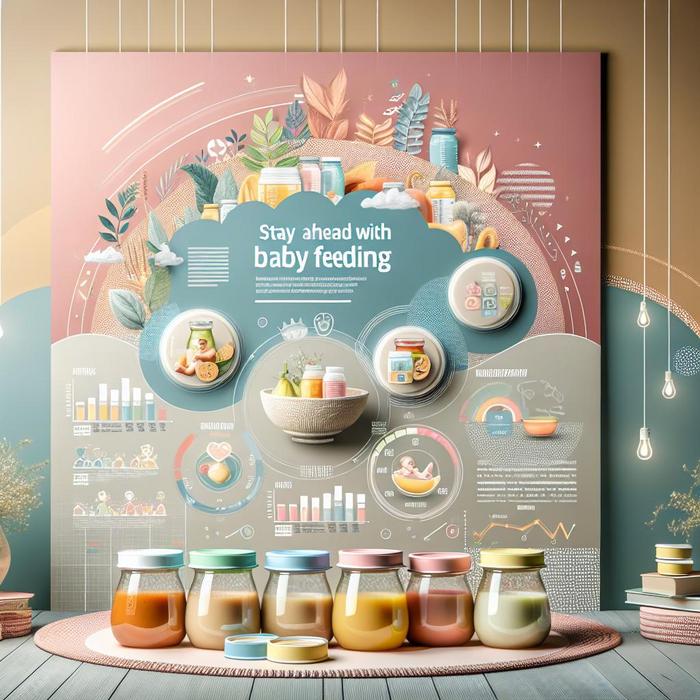An Insight into the Latest Baby Feeding Trends
Baby feeding trends have emerged as a hot topic among nutritionists, medical professionals, and parents alike. As our understanding of infant nutrition and baby health continues to expand, we’re seeing a lot more emphasis on both the substance and style of baby feeding methods. But what exactly are these trends, and why should parents and caregivers be interested? Let’s delve deeper.
Emergence of Health-Conscious Baby Food
With the rise of the health and wellness movement, the latest in infant nutrition is gravitating towards organic, non-processed, and health-conscious baby food. Parents are now more aware than ever of the long-term health implications of feeding habits established in infancy. Research shows that the baby food market is responding with more organic, sugar-free, and preservative-free options.
- Organic Baby Food: Free from any synthetic additives, pesticides, and genetically modified ingredients, organic baby food eliminates any potential health risks associated with these substances.
- Sugar-Free Baby Food: Exposure to high sugar levels at an early age can promote unhealthy eating habits, leading to obesity and diabetes. Parents are thus opting for sugar-free alternatives.
- Preservative-Free Baby Food: Food preservatives may lead to allergies or adverse reactions in babies. The trend is leaning towards fresh, homemade baby food or preservative-free packaged options.
Through incorporating these baby feeding trends into your child’s diet, you’ll be laying the groundwork for a healthier future.
Boosting Baby Health through Breastfeeding
While the benefits of breastfeeding have long been known, recent years have seen an uptick in its promotion as a key baby feeding trend. With numerous health benefits for both the mother and baby, breastfeeding is being encouraged more than ever before. It aids in developing the baby’s immune system, provides essential nutrients, and strengthens the emotional bond between mother and child. Moreover, breastfeeding initiatives such as the provision of lactation consultants in hospitals and the WIC Breastfeeding Support program are making this natural process more accessible to new moms.
Next-Gen Baby Bottles
Baby bottles have also undergone significant transformations to meet changing parent needs and preferences. Emerging trends in baby bottles indicate a shift towards more ergonomic designs, smart bottle technology, and eco-friendly materials. These improvements make feeding easier and safer, enhancing the overall feeding experience for both parent and baby.
- Ergonomic Designs: Modern baby bottles are designed with baby’s comfort in mind – bottles are now easier for tiny hands to hold, with teats designed to mimic the mother’s breast.
- Smart Bottle Technology: Tech additions such as temperature indicators, nutrient-preserving features, and sterilizing capabilities help to simplify the bottle-feeding process for parents.
- Eco-Friendly Materials: Parents are increasingly choosing eco-friendly bottle options such as glass or plant-based plastics, reducing their carbon footprint while ensuring baby’s safety.
Making Baby Feeding a Fun Learning Experience
Baby feeding can also serve as an immersive sensory learning experience. Incorporating playful elements such as colorful dishware or interactive feeding tools can help enhance the baby’s motor skills. Studies show that such play-based feeding methods can contribute to cognitive development while also making meal times more enjoyable.
Final Thoughts
Keeping up with the latest baby feeding trends is not about jumping on the bandwagon; it’s about understanding the best methods to nourish and nurture your baby. Armed with this knowledge, parents can make informed decisions about their baby’s nutrition, ensuring they grow up healthy and happy.
Customizing Baby Meals for Optimum Nutrition
Customized baby food is another emerging trend, emphasizing personalized nutrition to cater to individual needs. This new generation of baby food not only addresses common allergies but also provides nutritional variations to suit every unique metabolic requirement. World Breastfeeding Trends recommends customized meals to ensure all nutrients are well-balanced for the baby’s growth and development.
- Allergy-Free Baby Food: Customized baby food ensures a proper diet even for babies with food allergies. Allergen-free ingredients are used to prepare food that is safe and nutritious.
- Age-Appropriate Food: Baby food is customized based on the baby’s age, ensuring that it meets the developmental needs at different stages. It shifts from pureed food for early teethers to chunkier food for older babies.
- Diet-Specific Baby Food: For diet-conscious parents, baby food can be customized to be vegan, gluten-free, or follow any other specific dietary preferences, enabling nutritious and safe meal options.
Feeding Baby on Demand
The traditional practice of feeding at fixed intervals is being replaced by the more responsive ‘feeding on demand’. This method involves feeding the baby whenever they show signs of hunger, rather than following a strict schedule, and is back by the World Health Organization. It fosters a positive association with food, preventing overeating or undernourishment while enhancing the baby’s communication skills.
Role of Technology in Baby Feeding
Modern technology has brought remarkable advancements in baby feeding trends. From smart baby bottles to digital feeding trackers, technology is revolutionizing the ways babies are fed and the information parents can keep track of. Innova Market Insights predicts a rise in such technology-based feeding trends in the future.
- Smart Baby Bottles: Smart bottles can track the baby’s feeding patterns, measure the amount of milk consumed, and even detect the bottle’s temperature, ensuring the baby’s feed is always at the optimal temperature.
- Digital Feeding Trackers: These apps allow parents to keep a detailed record of their baby’s feeding schedule, including duration, quantity, and frequency of feeds – a boon for busy parents and those needing to track specific dietary needs.
Technology offers an innovative approach to baby feeding management, enforcing feeding efficiency, and ensuring optimum nutrition in every meal.
Feeding Babies with Superfoods
Gone are the days when babies were fed only milk and bland purees. Nowadays, the trend is to introduce babies to a variety of so-called ‘superfoods’ at an early age. These superfoods, rich in essential nutrients, provide everything needed for the baby’s growth and ensure the development of a robust immune system. Recent studies suggest that introducing such diverse and nutrient-packed foods at a tender age can significantly improve health outcomes in the future.
- Probiotic Foods: Infusing the baby’s diet with probiotics aids in building a healthy gut, boosting immunity, and promoting overall health.
- Iron-Rich Foods: Foods like spinach, lentils, and fortified cereals are excellent sources of iron, essential for baby’s healthy brain development.
- Fiber-Rich Foods: Introducing fiber-rich food like oats, fruits, and vegetables can help regulate their digestion and keep constipation at bay.
Baby-Led Weaning
Instead of spoon-feeding purees, the concept of baby-led weaning encourages babies to self-feed solid foods. With this method, babies learn to control their food intake, helping to develop their motor skills and foster a positive relationship with food.






